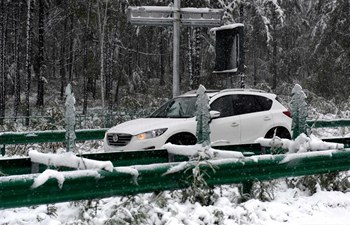By Li Xueyao, Xia Lin
NEW YORK, Aug. 28 (Xinhua) -- As the school year begins for international students who have arrived in the United States in recent days and are excited to adjust to school environment, four tips to help create knowledge base with campus security services and self-protection measures.
"International students are enjoying their area, this is maybe their first time visiting. So they are looking around, taking pictures, maybe looking like a tourist," said Wade MacAdam, who works with Police Department's Safety Programs, University of California, Berkeley.
He believes that those behaviors will make them easy target. "So they need to be more aware of their surroundings," MacAdam added.
According to the Preliminary Semiannual Uniform Crime Report 2016, released by FBI this year, the number of violent crimes in the United States increased by 5.3 percent for the first 6 months of 2016, when compared with figures reported for the same time in 2015, even though the number of property crimes decreased by 0.6 percent.
FBI's data shows that the number of aggravated assaults increased 6.5 percent, murders increased 5.2 percent, rapes (legacy definition) increased 4.4 percent, rapes (revised definition) rose 3.5 percent, and robbery offenses were up 3.2 percent.
Many international students came to their dream schools in the United States for better education. However, seeking a safe education should be of the first importance than academic success, as Yingying Zhang, a visiting scholar from China at the University of Illinois at Urbana-Champaign, is still missing after she was kidnapped on June 9.
"Some international students, including those from China, are usually introverted, unfamiliar with the new environment, or even speak poor English," said Fengxiang Qiao, Professor from Texas Southern University (TSU). "When police chief introducing security services during school orientation, some of them might not listen carefully, or even couldn't fully understand. So they are short of such knowledge."
California, New York, Texas, Massachusetts and Illinois are in sequence the top 5 states hosting international students, according to the Institute of International Education (IIE). So Xinhua interviewed students, local residents, security officers and professors from universities in these states to find useful self-protection suggestions, and there are four takeaways for international students.
CAMPUS "BLUE LIGHT" EMERGENCY PHONE
Most college campuses across the United States employ the "Blue Light" emergency phones. When students feel unsafe on a college campus, they can push the "call' button on the blue tower. Then, campus police will be dispatched to that location in few minutes. Students are usually familiar with the system during campus tours and freshman orientation.
The emergency phone system is a timely way to call campus police, especially when geography that causes spotty wireless coverage or 911 services fail.
"Don't necessarily call 911, because it goes straight to the Houston Police Department and they'll call us and it delays the time," said Fred Brown, the Deputy Chief of TSU Police.
"If you would call 911 from your cellular phone, it might go to a neighboring department and route to the university police," said MacAdam. "The only advantage with the blue light phone is we know where their location is. If you would call from your cell phone, we don't know, and you have to relate that information to us."
LATE NIGHT SECURITY ESCORT SERVICE
Security escort is another useful campus security service that students can rely on. This service is usually provided at late night. Different universities have their specific operating times and locations.
This service in New York University is called Safe Ride. It is a shared ride service, which is available for transportation to and from NYU facilities, and 3 local mass transit stations during the academic term from 12 midnight to 7:30am.
Northwestern university (NU) also provides the "Safe Ride" service. "If you are out late, you can call a police officer to walk with you, or request even a squad vehicle," said Jiayan Shi, a NU student.
Similarly, UC Berkeley has "Bearwalk" program. It works from sunset to 3 a.m. The major difference is that "Bearwalk" is a walking service that one of uniformed security officers will walk students safely from point A to point B within the campus' boundary.
MacAdam analyzed that a lot of pedestrian robberies occur when individuals are walking by themselves, "so if someone is walking with someone in uniform, they are most likely not to be a victim of crime."
AVOID BEING ALONE OFF CAMPUS AT NIGHT
Although most of the students being interviewed think the overall safety environment on campus is positive, it is a different story when off campus where robberies and thefts may occur, especially at night.
"When you go off campus, it becomes a little bit more dangerous, at least at night it does," said Molly Hurley, sophomore from Rice University.
"I just don't usually stay at school very late. If I have to stay at school, I will ask my roommate to go home together, or I will take the bus," said Qingni Yu, junior student from UC Berkeley. "Because my apartment is close to school, I can walk, but I just avoid walking alone, especially at night."
Another NU student named Hallie said, "I do go out of campus quite a lot for eating or social events. And I feel safe as I walk around downtown Evanston. But I do make sure that I' m not out late at night by myself, either go in groups or in dark."
"Either boy or girl staying outside at night or in places with few people, it is better to team up with friends, both for more confidence and power," said Yuan Wang, a student from NYU.
BE AWARE OF YOUR SURROUNDINGS
Students and security officers also mentioned that being alert the surroundings and avoiding wearing earphones are sensible ways for self-protection.
"If you buy a ticket at CTA subway station, you should keep an eye for the surroundings before you take out your wallet, or you should prepare the changes before buying your ticket," said Jiayan Shi, a NU student. "You should not wear ear phones when you are walking, you should keep aware of the surroundings. I think these tips are for all students."
"Do not plug both your ears while you are walking home in the middle of the night because that will make you very vulnerable and an easy target." Henry Cheng, a student from UC Berkeley.
MacAdam have the same suggestion that "They need to be not on the cell phone, texting, looking at their Facebook, not advertising their electronics to be stolen and they need to be aware of their surroundings. They also cannot be wearing headphone, because again the advertising their electronics to be stolen and they cannot hear if someone sneak upon them".

















